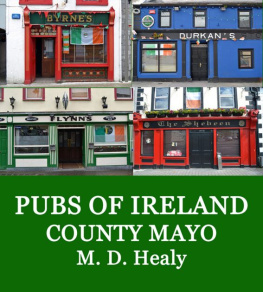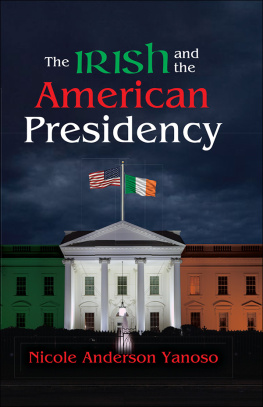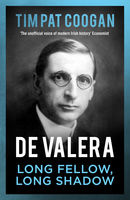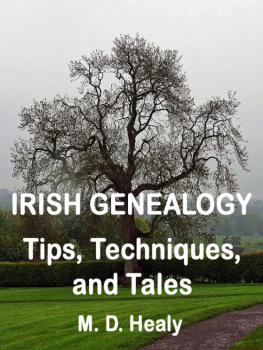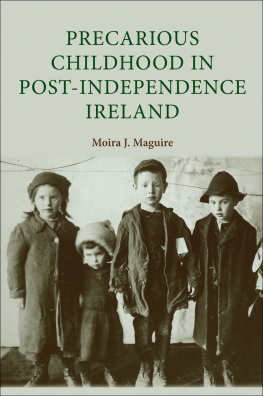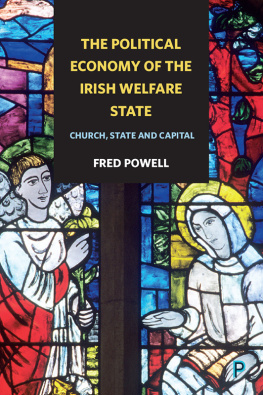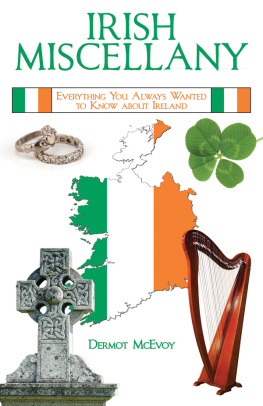The end of the Irish Poor Law?
The end of the Irish Poor Law?
Welfare and healthcare reform in
revolutionary and independent Ireland
DONNACHA SEN LUCEY
Manchester University Press
Copyright Donnacha Sen Lucey 2015
The right of Donnacha Sen Lucey to be identified as the author of this work has been asserted by him in accordance with the Copyright, Designs and Patents Act 1988.
Published by Manchester University Press
Altrincham Street, Manchester M1 7JA
www.manchesteruniversitypress.co.uk
British Library Cataloguing-in-Publication Data
A catalogue record for this book is available from the British Library
Library of Congress Cataloging-in-Publication Data applied for
ISBN 978 0 7190 8757 8
First published 2015
The publisher has no responsibility for the persistence or accuracy of URLs for any external or third-party internet websites referred to in this book, and does not guarantee that any content on such websites is, or will remain, accurate or appropriate.
Typeset in Sabon by
Servis Filmsetting Ltd, Stockport, Cheshire
Contents
Figures and tables
Figures
Tables
Acknowledgements
I would like to acknowledge the Irish Research Council which provided me with a Postdoctoral Fellowship to undertake the research that this book is based on. I am also grateful to the Centre for Contemporary Irish History, Trinity College Dublin where I held this award, and Professor Eunan OHalpin who mentored the fellowship. I would also like to thank Professor Virginia Crossman and my current colleagues on the Poverty and Public Health in Belfast and its hinterland project based in Queens University Belfast: Professor Peter Gray, Dr Georgina Laragy and Dr Olwen Purdue. I would also like to thank the staff of the following archives and libraries: the National Archives, Dublin; the National Library of Ireland, Cork County and City Archives, Kerry County Library, Kerry Diocesan Archives and the Oireachtas Library. Further thanks to Manchester University Press and Tony Mason. I would also like to thank Dr Ida Milne and Dr Ian Miller for reading earlier drafts of this work.
I would like to thank my family including my mother Joan, sisters Sined and Eileen, aunt Eileen, and my wifes parents Paul and Renee. Finally I want to thank my wife, Leanne, to whom I dedicate this book.
Abbreviations
| CCCA | Cork County and City Archives |
| CDHCH | Cork District Hospital and County Home |
| CMOH | County Medical Officer of Health |
| DD | Dil ireann Debates |
| DLG | Dil ireann Department of Local Government |
| DIB | Dictionary of Irish Biography |
| DLGPH | Department of Local Government and Public Health |
| HAO | Home Assistance Officer |
| IHS | Irish Historical Studies |
| IRA | Irish Republican Army |
| ITGWU | Irish Transport and General Workers Union |
| KBHPA | Kerry Board of Health and Public Assistance |
| KCL | Kerry County Library |
| LGB | Local Government Board |
| NAI | National Archives of Ireland |
| NHS | National Health Service |
| NLI | National Library of Ireland |
| NSPCC | National Society for the Prevention of Cruelty to Children |
| OAP | old age pension |
| OL | Oireachtas Library |
| SAO | Superintendent Assistant Officer |
| SCBPA | South Cork Board of Public Assistance |
| TD | Teachta Dla |
| UCD | University College Dublin |
Introduction
This book examines the poor law and attempts at its reform during the Irish revolution (191823) and in the initial decades of Irish independence. This period represented one of the most formative and crucial eras in Irish politics and society, with ideas of culture, nation, state and identity widely contested. Historical analysis of the history of welfare and the poor law during this seminal period remains limited, and this books appraisal of the relief of poverty addresses a previously underdeveloped aspect of the first decades of twentieth-century Ireland. The work provides a study of the intersection between welfare and politics during the revolutionary and the Irish Free State years. It examines the attitudes of advanced nationalists during the war of independence towards the poor and poverty, and the welfare policies enacted by Free State reformers. The transformation of public assistance regimes in independent Ireland is investigated. In particular, the establishment of county, district and cottage hospitals from what were formerly workhouses is examined. A key research question is whether the terms of entitlement to poor and medical assistance, based on poverty and destitution under the poor law, were actually transformed in the Free State? The books focus is not limited to national developments, and it analyses poor relief practices at a local and regional level. It contextualises the development of the Irish Poor Law system, and its subsequent transformation under the Irish Free State, within the wider reforms of welfare regimes that concurrently occurred throughout inter-war Britain and Europe. In doing so the book engages with the burgeoning international historiography which examines poor relief, welfare and healthcare in the first half of the twentieth century. Laissez-faire socio-economic thought influenced the development of nineteenth-century poor relief practices, and as a result principles of deterrence permeated many of the new welfare systems including the English New Poor Law, which was introduced in 1834. From the mid-to-late nineteenth century, and particularly during the early twentieth century, insurance-based welfare reform was introduced. In Ireland and Britain the Old Age Pension Act of 1908 and National Insurance Act of 1911 signalled the establishment of social security and represented the need for the state to provide more substantial assistance than provided under deterrent relief systems. These reforms were mostly targeted at the labouring and deserving classes. Generally speaking, these groups were increasingly politicised through the labour movement and viewed as central to the economic health of nations during an era of imperial expansion from the latter nineteenth century.1 By the early decades of the twentieth century, developing notions of citizenship, brought about by franchise reform, led to governments further bestowing rights on their citizens and expansion in welfare systems. However, those who were considered as failing to live up to social ideals, and whose poverty was viewed as emanating from personal failings, were chastised as immoral and subject to harsh policies, which were often influenced by eugenic concerns over population quality in many inter-war western societies. Such ideas resonated with the debates regarding the deserving and undeserving poor which permeated the mid-nineteenth-century poor law. This book analyses poor relief and poor law reform in Ireland within such contexts.


